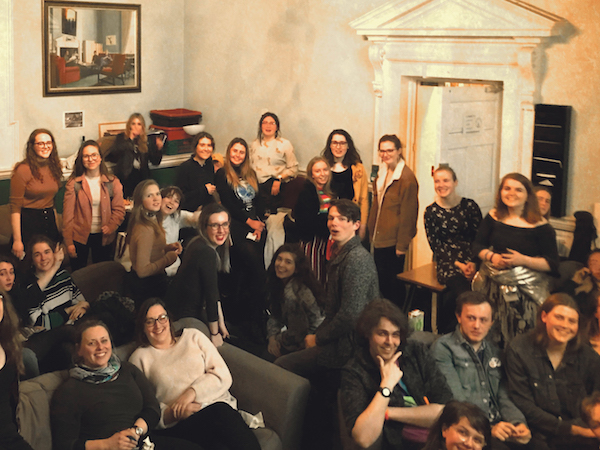Following four frustratingly unsuccessful attempts to achieve Central Societies Committee (CSC) recognition, the Vegan Society has finally achieved society status and could not be happier. William Stapleton, Chairperson of the society, lit up as he launched into discussing veganism, Trinity and how the two can become reconciled to one another.
“It is difficult to be a vegan in college”, Stapleton explained as he pondered over his own reasons for getting involved in the group. “It can be divisive and you often feel as though you have to explain yourself”, he concluded. With this in mind, Stapleton set about creating a society bent on promoting the vegan way of life through events, debates and, of course, food. Rejecting the commodification of animals, the Vegan Society hopes to develop their beliefs “as a positive force throughout campus”, one which hopes to appeal to students of all walks of campus life.
Of course at the heart of the society’s philosophy is the promotion of veganism. Stapleton mentioned the environmental aspects and the social aspects that come into play when it comes to the diet, stressing the importance of taking veganism into consideration beyond the stereotypes and preconceptions.
The society hopes to get students engaged with the wider issues through helping them to understand the societal, cultural and environmental elements that constitute the make-up of the diet. With this in mind, the society is open to welcoming members of all dietary doctrines – be they vegan, vegetarian or simply a curious foodie interested in learning more.
Indeed, standing alongside the society’s celebration of veganism is the commitment to inclusivity, something which Stapleton really stresses as being central to the society’s intention on campus. Dwelling on the controversy and often negative connotations associated with veganism, Stapleton emphasised his hope that the society will be “a positive presence on campus”. Assuring me that the group has no intention of staging any impassioned protests, Stapleton settled any residual controversy concerning the society’s place within Trinity campus life: “There’s no point in being an antagonistic presence on campus, we don’t want to be that – veganism is often seen in that way and it doesn’t need to be.”
As far as Stapleton is concerned, the society has been set up to organise good events, provide useful information for veggies and aspiring-veggies alike, and to open up the much-needed conversation of veganism on campus.
Setting up the society, although a trying and tedious task, appears to have ultimately been a beneficial experience for the group. With ample time to brainstorm ideas and articulate aims, the society has well and truly hit the ground running. Their first major event, a screening of Forks Over Knives was a resounding success and only a glimpse of what the group has in store for students entering into the final weeks of term. Moving forward, another movie screening with Trinity Environmental Society is in the works, aimed at analysing the intersection between veganism and environmentalism and how the two correspond to one another. Stapleton also mentioned the group’s weekly “Pig out with Vegan Society” where students can get together to eat lunch and “chat about all things vegan, and everything in between”.
Additionally, just before Trinity Ball, the society had designs in the works to collaborate with Skinful Affairs, an ethical makeup and beauty product business that, Stapleton hopes, will do demonstrations and inform students on how to ethically use beauty products.
The sheer number of events the society hopes to cram in before the end of term is certainly a testament to the passion and enthusiasm that seems to be driving the group to success.
Looking ahead to the society’s first full year in action, Stapleton animatedly concluded that “it’s all very exciting”. With designs to lure in enthusiastic first years during Freshers’ Week and even appeal to the more sceptical final-year students if they can, Stapleton hopes to boost the society’s membership, which is already at an impressive 100 students.
Moving into the year, the group has businesses lined up for talks and information evenings, along with various other speakers from all kinds of vegan-related backgrounds. Stapleton clearly has high hopes for the group’s inaugural year.
Despite a difficult beginning, Vegan Soc appears to have defied the odds and have certainly established themselves. The plethora of events expected in the final few weeks of term, along with the many already in the works for next year, point towards an exciting, vibrant and active society. The basis of the society’s intentions lies in the promotion of veganism, but the society’s inclusivity and broad spectrum of interests will certainly widen the appeal and contribute to their already fast-paced momentum.







